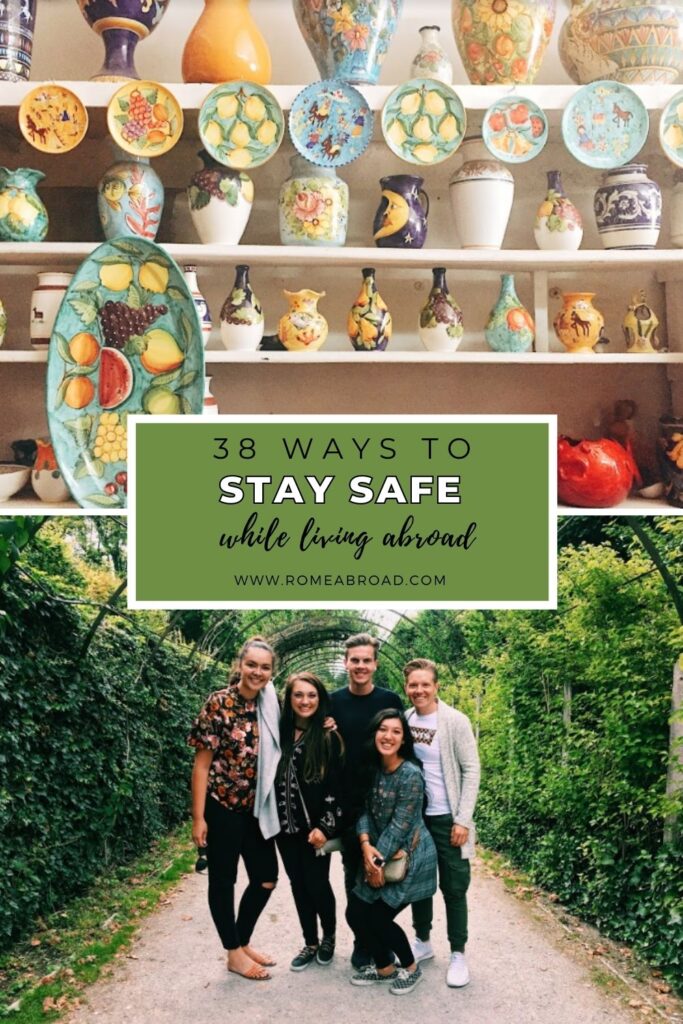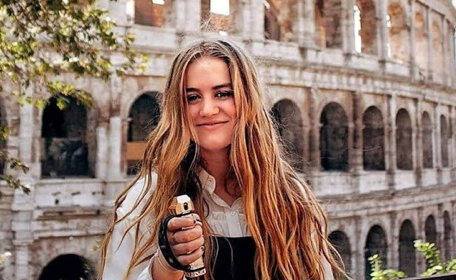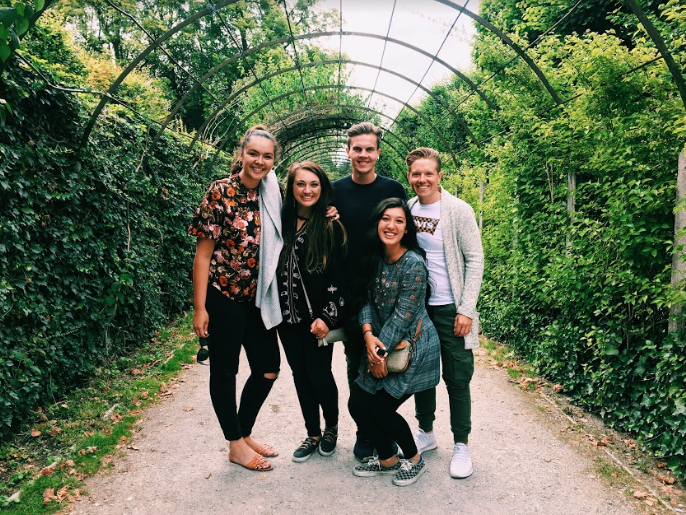We get asked all the time, “Will I be safe?” Our answer is usually something along the lines of: “You’ll be as safe as you are smart.” Or: “You’ll be as safe as you are at home.” It’s true. Living abroad can be very safe. Prepare yourself and you can avoid the majority of potentially difficult situations. Believe us, a little common sense goes a long way. If you’re living with a host family in our Spain, France, Italy, China, or Australia program, it’s easy to have an incredible experience while staying safe. And if you’re in the Teach in China program, you have even more flexibility (and responsibility). Of course, there are risks in whatever we do. But you can stay safe by following some simple guidelines.
How to avoid pickpockets
Did you know that the large majority of crimes suffered by tourists are nonviolent and avoidable? Tourists naturally attract petty thieves, but if you’re wise, you can avoid them. Hopefully these are comforting thoughts, because there is so much within your control! Here are some basic guidelines to avoid pickpockets:
- Be aware of your surroundings.
- Keep your personal belongings close to your body, especially when you’re in public areas.
- If you’re in a crowded place (especially on public transportation), wear your backpack or purse in a way that no one can open it or take it without you noticing.
- Stay away from dark or deserted places, especially at night.
Keep a healthy perspective
If you do get ripped off, remember this advice by Rick Steves:
“It’s best to get over it. You’re rich and thieves aren’t. You let your guard down and they grab your camera. It ruins your day and you have to buy a new one, while they sell it for a week’s wages on their scale. And the score’s one to nothing. It’s wise to keep a material loss in perspective.”
— Rick Steves
Listen to your host family (or local assistant)
If you’re in our Spain, France, Italy, China, or Australia program, you’ll live with a host family. Trust their guidance about what places to avoid and other things to do to stay safe. If you’re in our Teach in China program, you’ll have a local assistant who can help you with translation, transportation, and everything in between. Trust their advice about how to stay safe.
Be prepared before you go
Before you leave, we recommend you make 2 (or more) photocopies of your passport, any medical or eyesight prescriptions, and your flight itinerary. Then leave one copy of your passport with a family member or trusted friend back home. As you travel to your final destination, leave one copy in your luggage. When you arrive at your residence, leave your passport there (unless you’re traveling abroad). You can carry the photocopy with you and use it as ID when needed (i.e. buying a SIM card). Your driver’s license may also suffice as ID (when going to a bar, etc.) but it’s good to have the passport copy just in case.
Back up your photos frequently as you travel
I had a friend who was traveling in Thailand. On their last full day of the trip, she accidentally dropped her phone while it was raining. She sadly couldn’t find her phone and she hadn’t backed up any of her photos. All the pictures she had taken (including ones of her and her husband with elephants, diving in crystal blue water, and more) were gone.
Leave your expensive jewelry at home
Even if a thief doesn’t go for your jewelry specifically, it’s a signal to them that you might have money. You don’t want to mark yourself as a worthwhile target.
Consider wearing a money belt
A money belt is a small pouch with a zipper that you wear around your waist underneath your clothes. They’re super handy and give you the freedom of being hands-free while still carrying your important items safely.
Be prepared when you’re out and about
- When you go out and about, leave expensive gear like laptops at home. They’re safer at home than with you in a backpack on the streets.
- Remember that the likelihood of losing something is much greater than having something stolen.
- Always be in physical contact with your things. So if you’re eating at a restaurant (especially outdoor tables), don’t place small valuable items (phone, wallet, camera, etc.) on the table.
- Secure your bag when you’re not moving. You can do this by looping a strap around your leg or the leg of a chair.
- Use lockable zippers, twist-ties, paper clips, or key rings to make your bag harder for pickpockets.
- Be instantly alert anytime there’s a commotion — it might be a ruse for thieves to distract tourists.
- Be super alert whenever you’re in a crowd, especially flea markets and train stations. Place like these are a pickpocket’s playground because they are full of opportunities and easy escape exits.

Be wary of scams
There are many subtle ways to be scammed — someone might charge you triple normal price. Or they might offer you a deal that sounds too good to be true (hint: it is!). If you use Uber (DiDi in China), make sure everything matches up before getting in the vehicle.
NEVER get in an unmarked cab or taxi.
NEVER get in an unmarked cab or taxi.
NEVER get in an unmarked cab or taxi.
Money, money, money
- Be alert whenever money changes hands, even when you withdraw from ATMs.
- Remember that generally, cash is safer.
- Always know what you are paying for before handing over money.
- Be sure to count your change.
- Pickpockets can be clever — don’t be fooled by sob stories or official-looking uniforms.
Drinking guidelines
- NEVER drink and drive.
- Drinking puts you at risk of making bad choices that may cost you later.
- When you’re out, NEVER let your drink out of your sight.
- ALWAYS be aware of where your drinks come from.
- ALWAYS watch your drinks from the bar until they get to you.
- Be aware of your surroundings.
- Be upfront if someone is buying you drinks or hitting on you and you don’t want their attention.
- Drink plenty of water.
- Use the buddy system.
Other precautions
Did you know that you can log your travel plans with the State Department? Yep! When you do so, it allows the U.S. government to send you email alerts about potential problems abroad (i.e. demonstrations, etc.).
If you’re going abroad for an extended period of time, it’s a good to know how to contact the nearest American Embassy. We include this information in our training materials (which you receive at orientation). Or you can look it up online.
We also recommend you save emergency numbers for local authorities in your phone. Forget 911 while you’re abroad. In Europe, it’s 112. In Australia, 000. In China, it’s 110 (for calls) or 12110 (for texts).

Defending yourself
You may consider buying a defensive spray, such as the D.A.D.® 2. Check out how one Traveler used hers while living abroad. Use code ROMEABROAD for $30 off + free shipping ($40 total value).
Meeting up with others
If you’re in one of our programs, there are tons of ways to make friends while you’re abroad. Some of these ways are:
- the program group chat
- our foreign colleagues
- through your host family or local assistant
- Facebook groups
People in the program group chat have already been vetted by Rome Abroad. So meeting friends this way is extremely safe and highly encouraged. Our foreign colleagues also conduct their own vetting process so this makes those connections very safe as well. Friends introduced through your host family or local assistant are another great way to make friends.
If you want to meet people from Facebook or other online groups, be cautious. Check out their profile thoroughly beforehand. If you don’t feel good about meeting someone, don’t. We recommend to always meet new people in public, safe areas. Always tell your host mom where you’ll be, with whom, and when you’ll be back.



0 Comments